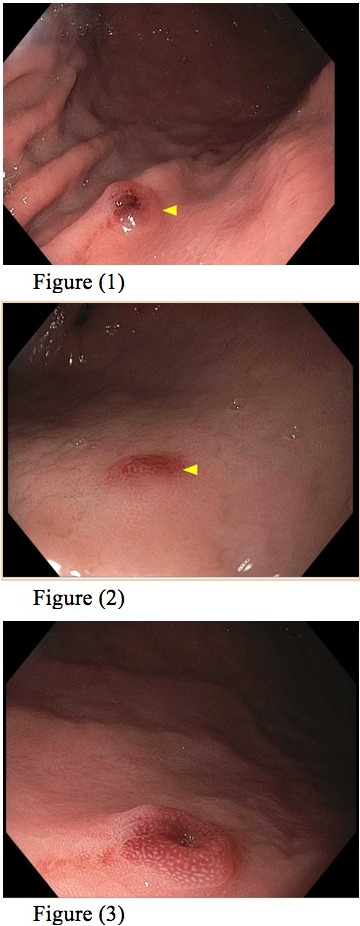Back
Poster Session E - Tuesday Afternoon
E0705 - Metastatic Germ Cell Tumor of the Testis Presenting as Coffee Ground Emesis
Tuesday, October 25, 2022
3:00 PM – 5:00 PM ET
Location: Crown Ballroom

Aya Tabbalat, MD
Case Western Reserve University - University Hospitals Cleveland Medical Center
Cleveland, OH
Presenting Author(s)
Aya Tabbalat, MD1, Adrian Lindsey, MD2, Linda C. Cummings, MD, MS1
1Case Western Reserve University - University Hospitals Cleveland Medical Center, Cleveland, OH; 2University Hospitals, Cleveland, OH
Introduction: Testicular cancer is the most common solid malignancy in males between the ages of 15 and 35. It is one of the most curable solid tumors with a 5-year survival rate of almost 95%. Testicular cancers are compromised of germ cell tumors (GCTs), which can be divided intoseminomatous and non-seminomatous GCTs (NSGCTs). We present a case of a 44 year old male presenting with scrotal swelling and coffee ground emesis, found to have metastatic non-seminomatous testicular cancer.
Case Description/Methods: A 44-year-old man with history of tobacco use presented with a one month history of scrotal swelling and an episode of coffee ground emesis. He also reported fevers, chills, night sweats, and unintentional weight loss. On presentation, he was tachycardiac. Physical exam was notable for a left, hard scrotal mass, tender to palpation; bilateral inguinal lymphadenopathy; and generalized abdominal tenderness. Laboratory testing showed elevated β- human chorionic gonadotropin and Alpha Fetal Protein levels. An ultrasound of the left scrotum showed a large mixed echogenicity mass. Computed tomography of the chest, abdomen, and pelvis revealed a left scrotal mass, concerning for metastatic disease to the liver and lungs along with mild mediastinal and upper abdominal retroperitoneal adenopathy. Gastroenterology was consulted for hematemesis and recommended an upper endoscopy. An EGD was done that revealed a non-bleeding gastric ulcer with a clean base in the gastric body, Forrest Class III (figure 1,2,3); normal duodenal bulb and second portion of the duodenum. Histopathology from the gastric ulcer showed a poorly differentiated neoplasm. Patient underwent left radical orchiectomy and was diagnosed with metastatic non-seminomatous testicular cancer, stage III C.
Discussion: Testicular cancer presents as a painless nodule or swelling of one testicle, but around 10% of patients have clinical manifestation that are due to metastatic disease. Common sites for metastatic disease include the lung, liver, bone, brain, and distant lymph nodes. Gastrointestinal metastasis is rare and occurs in < 5% of patients with NSGCTs and < 1% of patients with SGCTs. Metastasis to the GI tract occurs via direct extension from retroperitoneal/paraaortic lymph nodes and hematogenous spread. Due to their retroperitoneal location, the ileum and jejunum are the most common sites of metastatic disease within the GI tract. Our case represents gastric metastasis of NSGCT of the testis, which is exceedingly rare.

Disclosures:
Aya Tabbalat, MD1, Adrian Lindsey, MD2, Linda C. Cummings, MD, MS1. E0705 - Metastatic Germ Cell Tumor of the Testis Presenting as Coffee Ground Emesis, ACG 2022 Annual Scientific Meeting Abstracts. Charlotte, NC: American College of Gastroenterology.
1Case Western Reserve University - University Hospitals Cleveland Medical Center, Cleveland, OH; 2University Hospitals, Cleveland, OH
Introduction: Testicular cancer is the most common solid malignancy in males between the ages of 15 and 35. It is one of the most curable solid tumors with a 5-year survival rate of almost 95%. Testicular cancers are compromised of germ cell tumors (GCTs), which can be divided intoseminomatous and non-seminomatous GCTs (NSGCTs). We present a case of a 44 year old male presenting with scrotal swelling and coffee ground emesis, found to have metastatic non-seminomatous testicular cancer.
Case Description/Methods: A 44-year-old man with history of tobacco use presented with a one month history of scrotal swelling and an episode of coffee ground emesis. He also reported fevers, chills, night sweats, and unintentional weight loss. On presentation, he was tachycardiac. Physical exam was notable for a left, hard scrotal mass, tender to palpation; bilateral inguinal lymphadenopathy; and generalized abdominal tenderness. Laboratory testing showed elevated β- human chorionic gonadotropin and Alpha Fetal Protein levels. An ultrasound of the left scrotum showed a large mixed echogenicity mass. Computed tomography of the chest, abdomen, and pelvis revealed a left scrotal mass, concerning for metastatic disease to the liver and lungs along with mild mediastinal and upper abdominal retroperitoneal adenopathy. Gastroenterology was consulted for hematemesis and recommended an upper endoscopy. An EGD was done that revealed a non-bleeding gastric ulcer with a clean base in the gastric body, Forrest Class III (figure 1,2,3); normal duodenal bulb and second portion of the duodenum. Histopathology from the gastric ulcer showed a poorly differentiated neoplasm. Patient underwent left radical orchiectomy and was diagnosed with metastatic non-seminomatous testicular cancer, stage III C.
Discussion: Testicular cancer presents as a painless nodule or swelling of one testicle, but around 10% of patients have clinical manifestation that are due to metastatic disease. Common sites for metastatic disease include the lung, liver, bone, brain, and distant lymph nodes. Gastrointestinal metastasis is rare and occurs in < 5% of patients with NSGCTs and < 1% of patients with SGCTs. Metastasis to the GI tract occurs via direct extension from retroperitoneal/paraaortic lymph nodes and hematogenous spread. Due to their retroperitoneal location, the ileum and jejunum are the most common sites of metastatic disease within the GI tract. Our case represents gastric metastasis of NSGCT of the testis, which is exceedingly rare.

Figure: non-bleeding, clean based gastric ulcer (gastric body).
Disclosures:
Aya Tabbalat indicated no relevant financial relationships.
Adrian Lindsey indicated no relevant financial relationships.
Linda Cummings indicated no relevant financial relationships.
Aya Tabbalat, MD1, Adrian Lindsey, MD2, Linda C. Cummings, MD, MS1. E0705 - Metastatic Germ Cell Tumor of the Testis Presenting as Coffee Ground Emesis, ACG 2022 Annual Scientific Meeting Abstracts. Charlotte, NC: American College of Gastroenterology.
